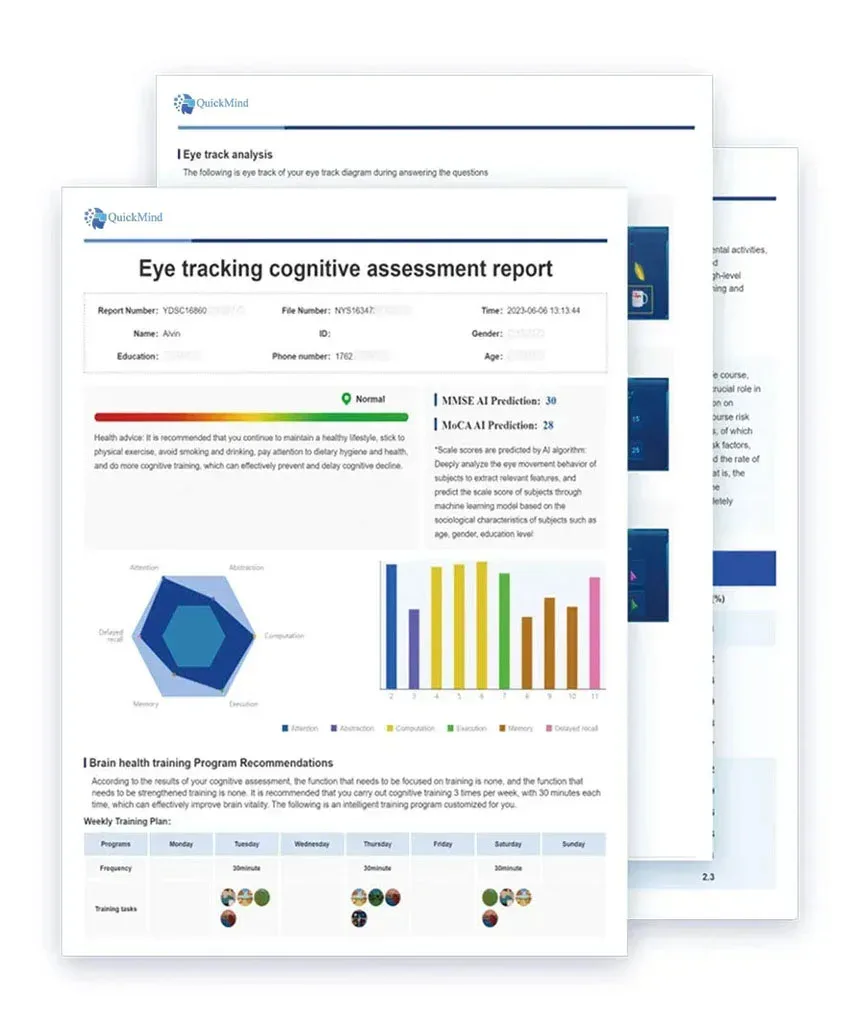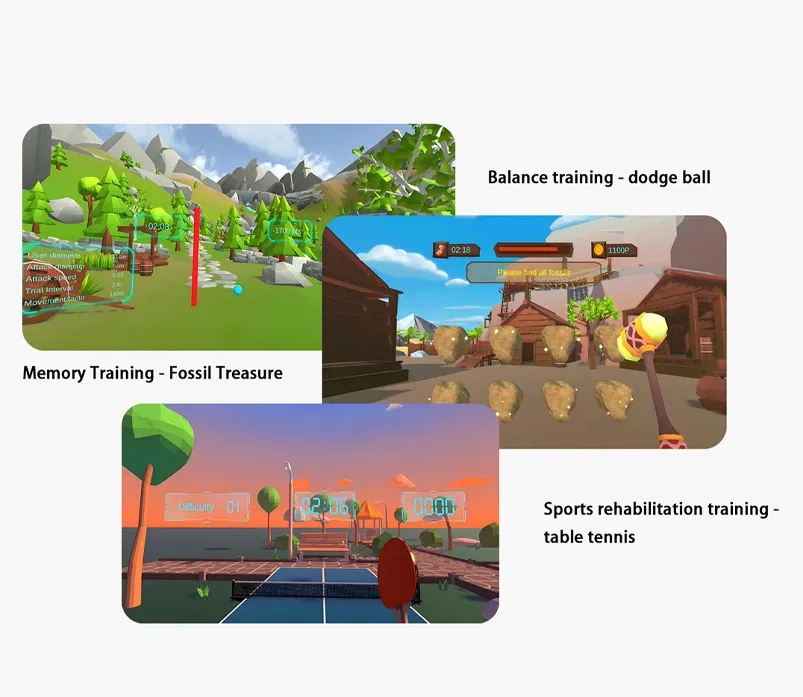
Advancing examinations demonstrates that Virtual Reality method can significantly augment the experiences of clients experiencing age-related cognitive diseases. By relocating them to serene surroundings, VR furnishes a unique possibility for mind energizing, affective stabilization, and collective involvement. Countless analyses have proved that VR therapy can alleviate agitation, worry, and despair in dementia patients while also enhancing their memorization, attention, and expressive competencies.
- VR empowers persons with dementia to rehash valued experiences through dynamic simulations.
- Moreover, it can provide a safe and caring space for community involvement, promoting a sense of association and affiliation.
- Clinicians conclude that VR therapy has the likelihood to reinvent dementia service by contributing new and cutting-edge methods to confront the complicated difficulties faced by patients struggling against this condition.
Tech-Driven Cognitive Therapies for Alzheimer's Patients
Innovative digital methods are demonstrating potential in the sector of cognitive enhancement for people struggling with cognitive Alzheimer's illness. These tools harness electronic devices to activate brain capability and conceivably retard the evolution of the syndrome. Game-based practices, personalized coaching, and intellectual training are some demonstrations of procedures being studied in this flourishing domain. While research are progressing, digital therapeutics deliver a substitute means for enhancing the quality of those suffering from neurodegenerative Alzheimer type.Exploring Virtual Worlds: Innovative Methods for Alzheimer's Care
Involving patients managing neurodegenerative Alzheimer's type, the steady erosion of brain power and neural capabilities can significantly weaken their power to engage with the immediate surroundings. This damaging illness often elicits in withdrawal, confusion, and a diminished self-awareness. Fresh progresses in virtual reality technology unveil a trailblazing pathway to mitigate these problems by generating immersive atmospheres that can engage the brain and strengthen cognitive function.
Digital immersive sceneries configured specifically for Alzheimer's clients can convey them in safe locations, such as their juvenile habitat or a popular natural site, reminiscing positive memories and lowering anxiety. Through interactive tasks, these virtual worlds can also test cognitive abilities like recollection, concentration, and reasoning.
The possible gains of virtual reality in Alzheimer's healing are vast. Early examinations have established hopeful results, with clients manifesting improvements in cognitive operation, mood, and overall quality of life. As this technique continues, it holds the key to reshaping the way we approach Alzheimer's disease, due a new pathway for care and empowerment.
Immersive Reminiscence Sessions in Alzheimer's
Reminiscence therapy is a well-respected technique used to advance cognitive function and quality of life in individuals with Alzheimer's disease. This customary form of therapy involves eliciting patients to share past experiences, often through dialogue. However, a advanced approach is emerging: VR-mediated reminiscence therapy.
This immersive tool utilizes virtual reality headsets to relocate patients in realistic environments that invoke memories from their past. By participating these digital reconstructions, individuals with Alzheimer's can bond with their past in a influential way.
Virtual Reality as a Memory and Cognitive Booster in Dementia
Virtual reality (VR) is emerging as a prospective resource in the fight against dementia, presenting modern ways to stimulate memory and cognition. By generating immersive experiences, VR can aid individuals with dementia revisit memories, engage in meaningful activities, and improve cognitive abilities. Studies have shown that VR interventions can lead to important improvements in memory recall, attention, and dimensional awareness. Moreover, VR provides a reliable and inviting space for individuals with dementia to demonstrate, reducing feelings of isolation and apprehension.
- In addition, VR can be fitted to individual needs and preferences, enabling enhanced levels of involvement.
- Notwithstanding the prospects of VR, ongoing research is needed to fully understand its long-term impact in dementia care.
Memory Revival and Social Renewal: VR's Role in Alzheimer's Community Engagement
Digital simulated realms is emerging as a novel solution in the realm of cognitive disorders. By simulating interactive and interactive realities, VR has the possibility to reignite memories, cultivate social interaction, and advance the overall quality of life for patients experiencing Alzheimer's. Arguably the most significant aspects of VR is its ability to transfer users to familiar environments and moments from their past. Whether it's a excursion in a childhood home or a recreation of a beloved holiday, these virtual visits can evoke happy memories and enhance cognitive function. Furthermore, VR can aid social interaction by uniting individuals with others who share similar pastimes. This can be particularly beneficial for people with Alzheimer's who may encounter obstacles with traditional social communication. By providing a safe and absorbing virtual space, VR can minimize feelings of isolation and loneliness, which are common among users experiencing Alzheimer's. Overall, VR holds immense potential for overhauling the lives of patients with Alzheimer's by resurrecting memories, strengthening connections, and boosting their quality of life. As technology persists in grow, we can expect even cognitive function reheablation more imaginative applications of VR in the field of dementia care.Exploiting Cognitive Training: Utilizing VR for Alzheimer's Symptom Management
VR technology is rapidly emerging as a game-changing tool in the realm of cognitive training, particularly for individuals dealing with Alzheimer's disease. By immersing patients in interactive and engaging virtual environments, VR-based interventions can boost cognitive functions such as memory, attention, and problem-solving. These games often incorporate elements of storytelling, exploration, and social interaction, making the training process exceptionally satisfying. Studies have shown that VR-based cognitive training can lead to substantial improvements in cognitive performance, hypothetically delaying the progression of Alzheimer's symptoms. Moreover, VR provides a safe and controlled environment for patients to practice new skills and improve their confidence.
- Interactive gaming in VR training can make it extremely immersive and fun for clients with brain function issues.
- VR simulations can offer realistic scenarios that spur and energize cognitive functions.
- Personalized VR experiences can cater to distinct expectations and habits.
Harnessing Virtual Settings for Dementia Relief
Immersive digital environments offer a breakthrough and hopeful avenue for subjects undergoing dementia. These approaches can recreate familiar environments, allowing those affected by cognitive decline to revisit cherished memories and build a sense of consolation. By alleviating the symptoms of dementia, VR environments have the potential to refine quality of life for both persons and their supporters.
- Studies indicate that VR interventions can favorably impact cognitive function, behavioral well-being, and even movement abilities in individuals with dementia.
- Moreover, VR offers a safe and protected environment for participation, reducing the risk of damage.
- Additionally, VR can strengthen social communications by allowing individuals with dementia to participate in cyber activities with others.
VR: A Promising Approach to Alzheimer's Diagnosis and Treatment
cognitive Alzheimer's illness poses a complicated difficulty, often being undiagnosed in its early stages. Though, virtual reality (VR) is gaining traction as a cutting-edge tool for identifying the disease at an early stage. Through immersive virtual worlds, VR can evaluate cognitive operation in ways that traditional methods are insufficient to. This ability allows for early treatment strategies, potentially retarding disease progression and upgrading the quality of life for participants with Alzheimer's.
- VR platforms enable safe and monitored examination of memory, attention, and navigation abilities.
- Customized virtual reality sessions assist users to involve themselves in cognition-stimulating exercises.
- Interactive virtual contexts enable socialization and interaction for Alzheimer's patients.
Enhancing Dementia Communication and Social Interaction Via VR
{In the realm of dementia care, innovative technologies are emerging to upgrade the lives of patients with cognitive impairments. Virtual reality (VR) is one such innovation that holds immense opportunity for bridging the communication and interaction gap often experienced by those with dementia. By developing compelling digital realities, VR can engage cognitive function, reduce behavioral issues, and ultimately improve the overall well-being of dementia patients.
VR experiences personalized for cognitive decline support can range from memory therapy sessions that immerse patients in recognizable historic moments, to interactive games that promote social interaction and cognitive exercise. Furthermore, VR has the competence to connect subjects affected by dementia with companions, regardless of physical limitations, fostering a sense of solidarity.
- VR can assist in reducing agitation and anxiety by providing a calming and enticing environment.
- Clinical trials have shown that VR interventions can lead to improvements in cognitive function, mood, and social interaction in individuals with dementia.
- As technology expands in evolve, we can expect even more innovative and {effective|beneficial|helpful|powerful|impactful|successful|productive|efficient
